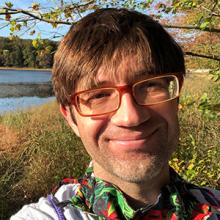Phil Skiba: Purpose During the Pandemic
This is the second episode of Inside Science Conversations that features Dr. Phil Skiba. In episode one, Skiba described how he went from wanting to be an astronaut to helping top athletes excel endurance sports, from triathlons to marathons and more.
In this part of the discussion, Chris Gorski asks Skiba about how the COVID-19 pandemic has affected athletes and front-line workers. Skiba details how doctors have adapted to the challenge of treating patients with the coronavirus and the toll the pandemic has taken on the people who work in the medical system.
The show is available on many of your favorite podcast platforms, including Apple and Spotify. It's also on YouTube.
Here are some excerpts from the interview (the full transcript is available here):
"I was a third- or fourth-generation volunteer firefighter. Before I went to medical school, that's what I did in my hometown in New York. The way I was raised was, when something's on fire, you run towards it, not away from it. And so, I volunteered to work at the front line. We opened up these MASH tents behind the hospital. They were trying to keep the hospital from being overrun. And so I spent the first few months of the pandemic, working on the front line, which was scary as hell to see it face to face, and all that's between you and it are a pair of goggles, and this N-95 mask. Every now and then you almost felt like you were kind of standing outside yourself watching it …
"What we've really had to do is develop this kind of post-COVID training program, essentially, where we do pulmonary rehab to strengthen their inspiratory muscles and things so that they can breathe better. And start exercising them so that we can get them to build up a level of fitness so that their day-to-day life doesn't feel like such a challenge. And so it's this really strange twist on what I already was doing for elite athletes, which was trying to find a way to help these people gain new function, and just get them back to where they used to be, versus taking them from where the average person is and making them fast …
"I understand why so many physicians and so many nurses and respiratory technicians are burning out. It's because I'm here trying to save your life, and you won't do the bare minimum of putting on a mask, or not going out to eat, or whatever it takes to try to slow this down. Why am I risking my life again? You know, because I mean, I have friends, I have three friends that were killed by this. So it's personal for me, and at some point, there is an element of self-preservation that kicks into your thinking. And it's like, yeah, I'm doing the right thing. But should I keep doing the right thing? Or do I need to start worrying about myself? Every physician has thought about that in the last two years, and anyone who claims they haven't is lying. And all of us have different answers. I'm still in the game. I know guys who aren't."
Our next episode is scheduled to come out in two weeks, please like and subscribe on your favorite platform. We hope you enjoy the show.
The Inside Science Conversations podcast showcases the human side of science. It's about what makes scientists and researchers tick. We'll cover a wide variety of subjects, from record-breaking running to the hidden history of science. Please, like and subscribe to the show on your favorite podcast platform. Join us as we talk to researchers and authors about their work, their lives and why science is important for everyone.

